2022年中考英语 考点专项突破课件: 第二章 第二节 代词(61张PPT)
文档属性
| 名称 | 2022年中考英语 考点专项突破课件: 第二章 第二节 代词(61张PPT) | 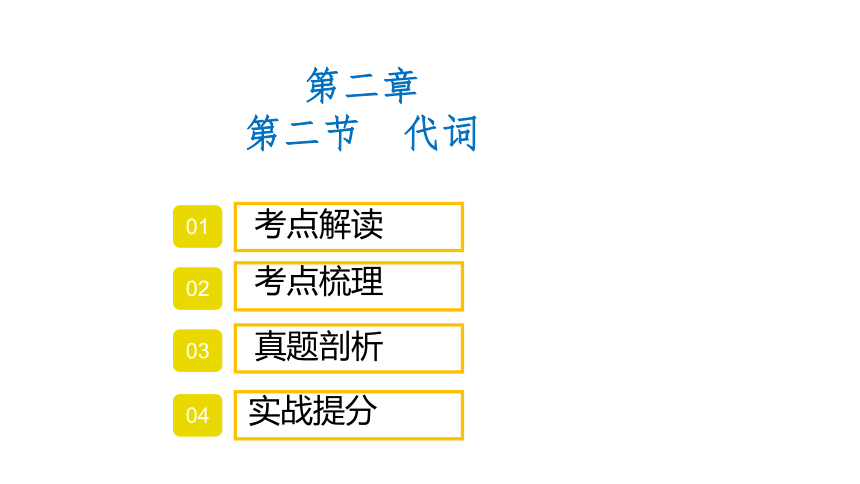 | |
| 格式 | pptx | ||
| 文件大小 | 420.0KB | ||
| 资源类型 | 教案 | ||
| 版本资源 | 牛津译林版 | ||
| 科目 | 英语 | ||
| 更新时间 | 2022-05-10 20:17:29 | ||
图片预览

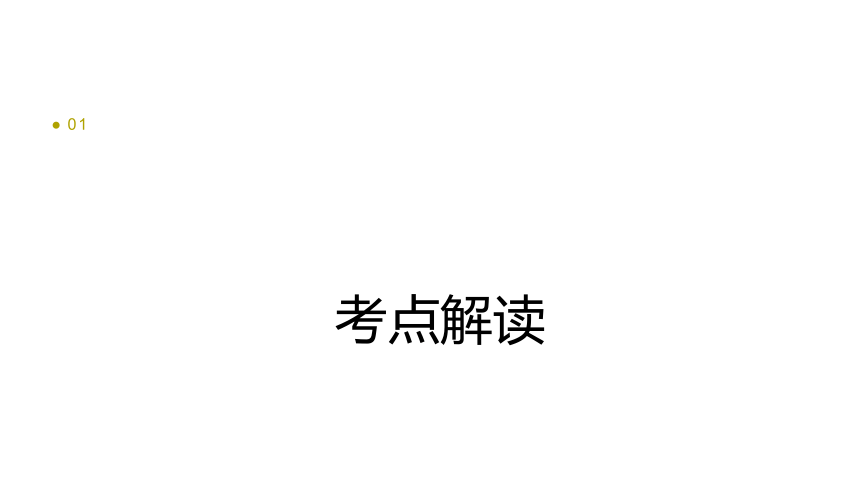

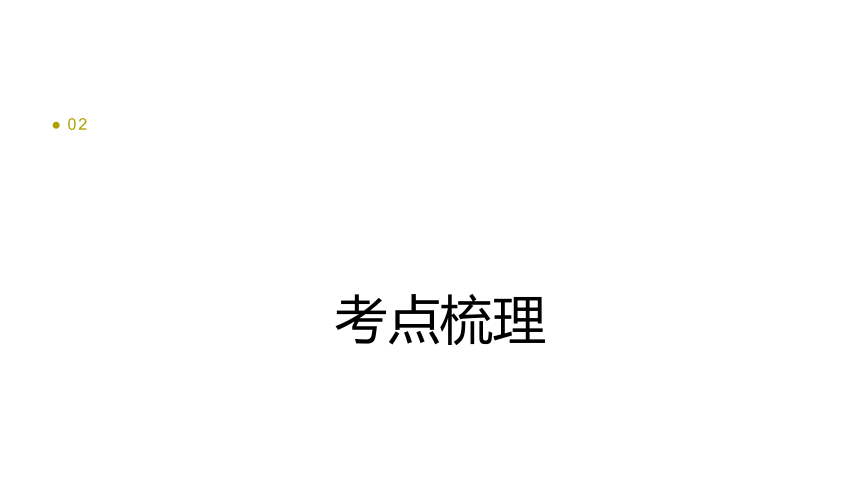
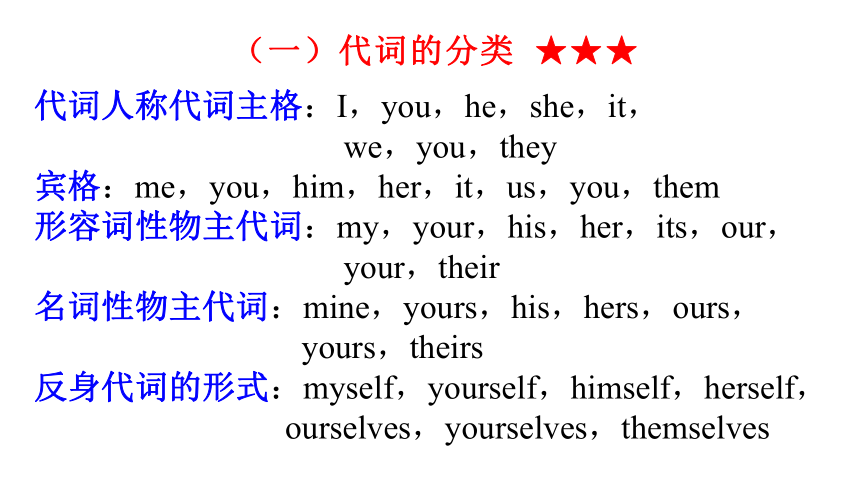
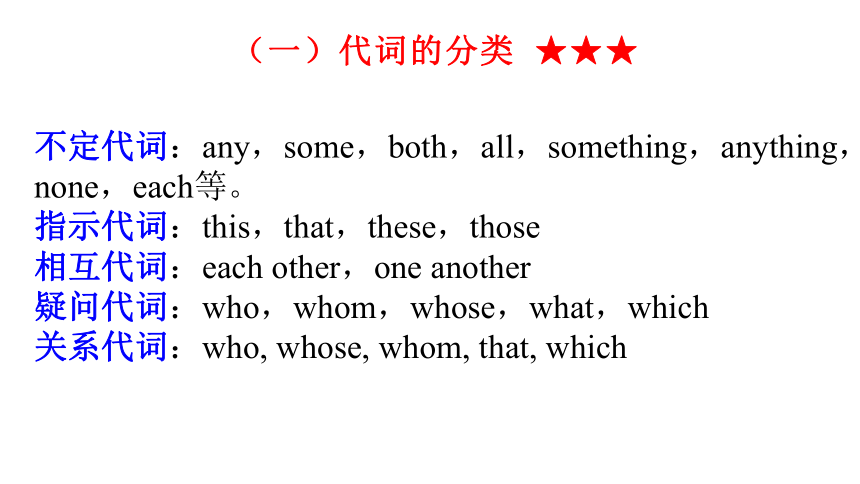
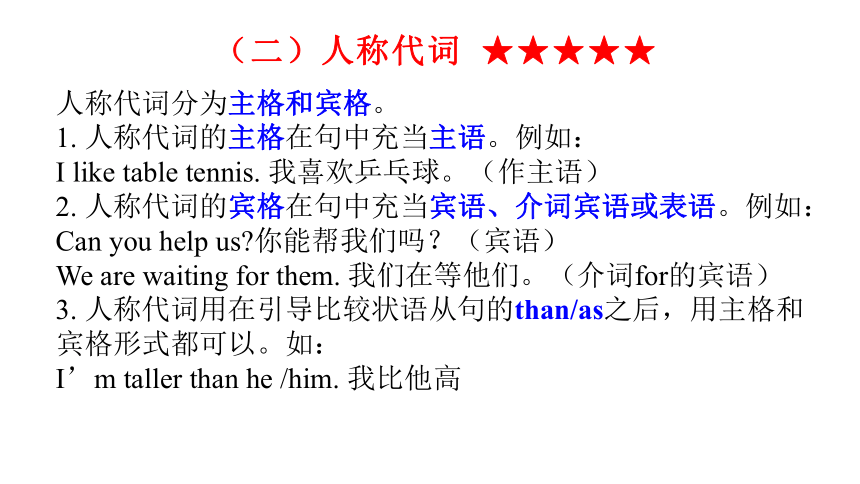
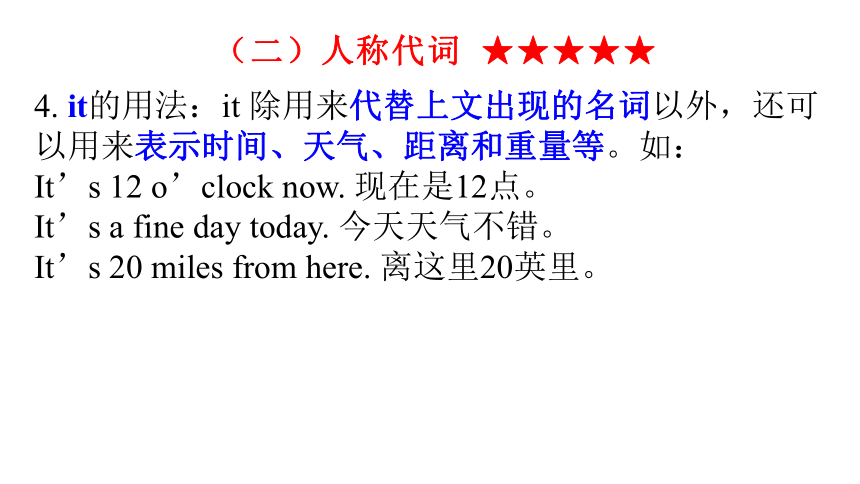
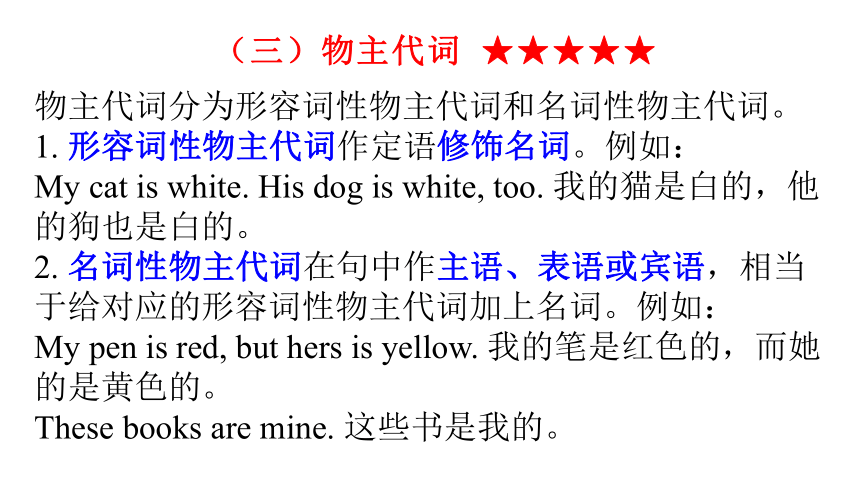
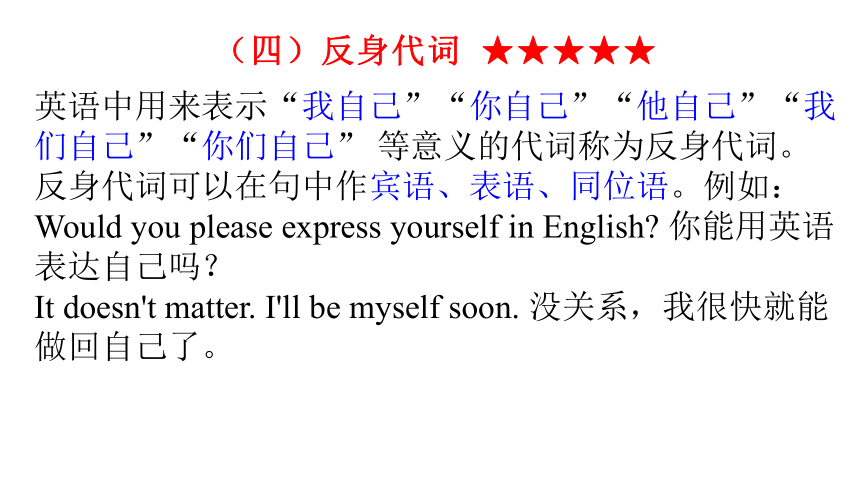
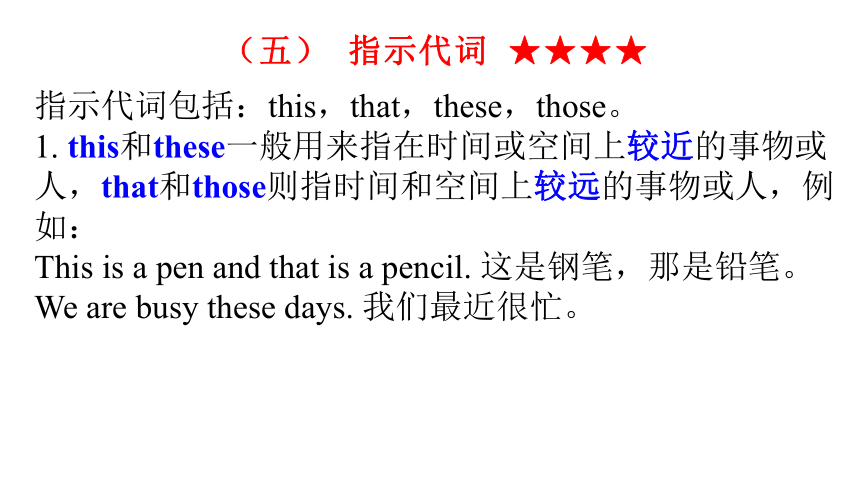
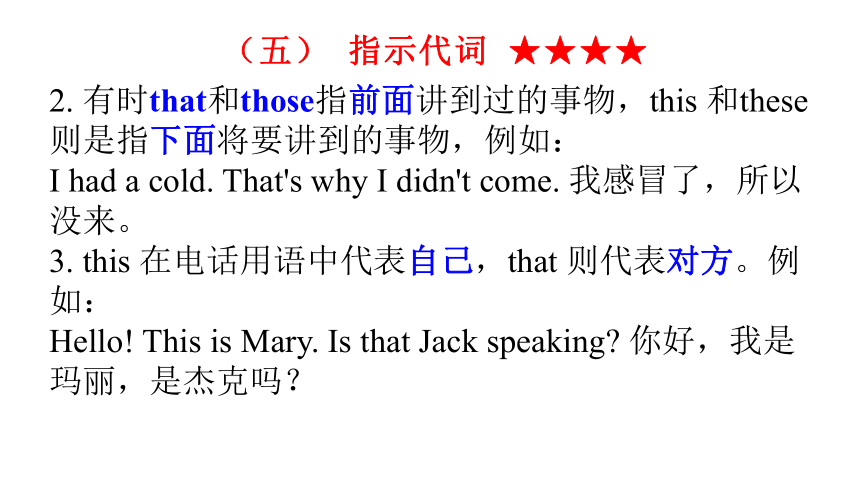
文档简介
(共61张PPT)
01
考点解读
02
03
04
考点梳理
真题剖析
实战提分
第二章
第二节 代词
01
考点解读
02
考点梳理
(一)代词的分类 ★★★
代词人称代词主格:I,you,he,she,it,
we,you,they
宾格:me,you,him,her,it,us,you,them
形容词性物主代词:my,your,his,her,its,our,
your,their
名词性物主代词:mine,yours,his,hers,ours,
yours,theirs
反身代词的形式:myself,yourself,himself,herself,
ourselves,yourselves,themselves
(一)代词的分类 ★★★
不定代词:any,some,both,all,something,anything,none,each等。
指示代词:this,that,these,those
相互代词:each other,one another
疑问代词:who,whom,whose,what,which
关系代词:who, whose, whom, that, which
(二)人称代词 ★★★★★
人称代词分为主格和宾格。
1. 人称代词的主格在句中充当主语。例如:
I like table tennis. 我喜欢乒乓球。(作主语)
2. 人称代词的宾格在句中充当宾语、介词宾语或表语。例如:
Can you help us 你能帮我们吗?(宾语)
We are waiting for them. 我们在等他们。(介词for的宾语)
3. 人称代词用在引导比较状语从句的than/as之后,用主格和宾格形式都可以。如:
I’m taller than he /him. 我比他高
(二)人称代词 ★★★★★
4. it的用法:it 除用来代替上文出现的名词以外,还可以用来表示时间、天气、距离和重量等。如:
It’s 12 o’clock now. 现在是12点。
It’s a fine day today. 今天天气不错。
It’s 20 miles from here. 离这里20英里。
(三)物主代词 ★★★★★
物主代词分为形容词性物主代词和名词性物主代词。
1. 形容词性物主代词作定语修饰名词。例如:
My cat is white. His dog is white, too. 我的猫是白的,他的狗也是白的。
2. 名词性物主代词在句中作主语、表语或宾语,相当于给对应的形容词性物主代词加上名词。例如:
My pen is red, but hers is yellow. 我的笔是红色的,而她的是黄色的。
These books are mine. 这些书是我的。
(四)反身代词 ★★★★★
英语中用来表示“我自己”“你自己”“他自己”“我们自己”“你们自己” 等意义的代词称为反身代词。反身代词可以在句中作宾语、表语、同位语。例如:
Would you please express yourself in English 你能用英语表达自己吗?
It doesn't matter. I'll be myself soon. 没关系,我很快就能做回自己了。
(五) 指示代词 ★★★★
指示代词包括:this,that,these,those。
1. this和these一般用来指在时间或空间上较近的事物或人,that和those则指时间和空间上较远的事物或人,例如:
This is a pen and that is a pencil. 这是钢笔,那是铅笔。
We are busy these days. 我们最近很忙。
(五) 指示代词 ★★★★
2. 有时that和those指前面讲到过的事物,this 和these则是指下面将要讲到的事物,例如:
I had a cold. That's why I didn't come. 我感冒了,所以没来。
3. this 在电话用语中代表自己,that 则代表对方。例如:
Hello! This is Mary. Is that Jack speaking 你好,我是玛丽,是杰克吗?
(六)疑问代词 ★★★★
即用来构成特殊疑问句的代词。
1. who(代替人,作主语)例如:Who opened the door 谁开的门?
2. whom(代替人,作宾语)例如:Whom are you looking for 你在找谁?
3. whose(代替人,作定语)例如:Whose bike is it 这是谁的自行车?
(六)疑问代词 ★★★★
4. what(代替物,问职业时可代替人)例如:What's this 这是什么?
5. which(代替人或物),例如:Which bus shall we take 我们坐哪辆车?
(七)关系代词 ★★★
关系代词是一种引导从句并起连接主句和从句作用的代词。关系代词有 who, whose, whom, that, which, 它们在句中可用作主语、表语、宾语和定语。 在主句中,它们还代表着从句所修饰的那个名词或代词。例如:
I hate people who talk much but do little. 我讨厌说得多做得少的人。
I'm looking at the photograph which you sent me with your letter. 我在看你信中寄给我的照片。
(八)不定代词 ★★★★★
不定代词是用来表示不指明代替任何特定名词的代词。《新课标》要求在初中阶段掌握的不定代词有: none,neither,(a) little, (a) few, all, both, each, either 等。
(八)不定代词 ★★★★★
1. any, some
(1)any一般用于疑问句、否定句或条件从句中,表示“什么”“一些”或“一点”等意思,有时可以不译出来。作定语时,any所修饰的可以是可数名词或不可数名词,可数名词也可以是单数或复数(通常多用复数)。例如:
Is there any milk in the bottle 瓶子里有牛奶吗?
There isn't any milk in the bottle. 瓶子里没有牛奶了。
(八)不定代词 ★★★★★
(2)any有时也可以用于肯定句中,意为“任何”“随便”等。如:
You may come at any time. I will be free in the morning. 你随时都可以来,我明早就有空了。
(3)some一般用于肯定句,表示“一些”“某些”“某个”等意思。作定语时,可修饰可数名词或不可数名词。例如:
There is some bread on the plate. 盘子里有面包。
(八)不定代词 ★★★★★
(4)some也可以用于疑问句,表示期望得到肯定的回答,或表示邀请、请求的意思。如:
Would you like to drink some water 你想喝点水吗?
(八)不定代词 ★★★★★
2. little, a little, few, a few
(1)little(修饰不可数名词),few(修饰可数名词),表示“没有多少”的意思,侧重于否定的意思。例如:
There is little water left in the basin. 盆里没剩下多少水了。
(八)不定代词 ★★★★★
3. all,both
(1)all指数目是三者以上的人或事物,既可以修饰复数可数名词,也可以修饰不可数名词。谓语动词既可以用单数,也可以用复数。在句中作主语、表语、宾语、同位语和定语。例如:
All of us like Mr Pope. 我们都喜欢Pope先生。(作主语)
=We all like Mr Pope. (作同位语)
(八)不定代词 ★★★★★
All the water has been used up. 所有的水都用完了。(作主语)
That's all for today. 今天就到这里吧。(作表语)
Why not eat all (of) the fish 为什么不把所有的鱼都吃掉?(作宾语)
All the leaders are here. 所有的领导都在这里。(作定语)
(八)不定代词 ★★★★★
(2)both作代词。
①与其他名词或代词并列出现,表示“两个都”。 例如:
Lucy and Lily both agree with us. Lucy 和 Lily 都同意我们的观点。
②与“of +代词(或名词)”连用,表示“两者都”。 例如:
Both of them came to see Mary. 他们两个都是来看玛丽的。
(八)不定代词 ★★★★★
③单独使用,表示“两者(都)”。例如:
Michael has two sons. Both are clever. Michael 有两个儿子,都很聪明。
(3)both用作形容词,放在名词之前,修饰该名词,表示“两者都”。 例如:
Both his younger sisters are our classmates. 他的两个妹妹都是我们的同学。
(八)不定代词 ★★★★★
4. other, the other, another, others, the others
(1)other可以作形容词用,后面可以跟单数或复数名词,意思是“其他的、别的”。 例如:
I haven't any other pens except this one. 除了这支笔,我没有别的笔了。
Where are his other pens 他其他的钢笔在哪儿?
(八)不定代词 ★★★★★
(2)other也可以用作代词,与冠词the连用构成“the other”,表示两个人或物中的“另一个”。常与one搭配构成“one ..., the other ... ”句型。例如:
He has two sisters. One is 9 years old, the other is 4 years old. 他有两个妹妹,一个9岁,另一个4岁。
(八)不定代词 ★★★★★
(3)another可以作形容词用,修饰后面的名词,意为“另一个”,还可以跟代词one。 例如:
You can see another plane in the sky, can't you 你能在天空中看到另一架飞机,是吗
another也可以作代词用,表示“另一个”。 例如:
I'm still hungry after I've had this cake. Please give me another. 我吃了这个蛋糕还是很饿,请再给我一个。
(八)不定代词 ★★★★★
(4)other作代词用时,可以有复数形式“others”,泛指“另外的人或物”。常与some搭配构成“some..., others ... ”句型。例如:
Some went to the park, others went to the zoo. 有些去了公园,有些去了动物园。
(八)不定代词 ★★★★★
(5)“the others”表示特指某范围内的“其他的人或物”。 例如:
We got home by 4 o'clock, but the others didn't get back until 8 o'clock. 我们4点到家,但其他人8点才回来。
In our class only Jim is English, the others are Chinese. 我们班只有吉姆是英国人,其他都是中国人。
(八)不定代词 ★★★★★
5. each, every
(1)each指两个或两个以上的人或物的“每一个”,强调个体,既是代词(可作主语、宾语、同位语),也可是形容词(作定语)。例如:
Each takes a cup of tea. 每人喝一杯茶。(作主语)
We each have an English?Chinese dictionary. 我们每个人都有一本英汉词典。(作同位语)
I gave two storybooks to each of them. 我给了他们每人两本故事书。(作宾语)
Each child can get a present. 每个孩子都可以得到一份礼物。(作定语)
(八)不定代词 ★★★★★
(2)every则指三个或三个以上的人或物中的“每一个都”,强调整体,只作形容词。例如:
Every student loves the English teacher. =All students love the English teacher. 每个学生都喜欢英语老师。
Every child likes playing. =All children like playing. 每个孩子都喜欢玩。
(八)不定代词 ★★★★★
6. no, not any
no=not any,只有形容词性质,在句中作定语,表示否定,意思是“没有”“不是”,可修饰单、复数可数名词和不可数名词。例如:
He has no money. 他没有钱。
There are no letters for you today. 今天没有你的信。
用于警告、命令等标识。如:
No smoking! 禁止吸烟! No parking. 不准停车。
(八)不定代词 ★★★★★
6. no, not any
用于一般疑问句的否定回答。如:
—Are you in Class One 你在一班吗?
—No, I am not. 不,我不是。
not与no的区别:not可以用来否定动词,no则没有这种功能。no是具有形容词性质的不定代词,只能与名词或相当于名词的词连用。如: no time。
(九)相互代词 ★★★
表示相互关系的代词叫作相互代词。相互代词有each other 和one another两种形式。在当代英语中,each other和one another没有什么区别。相互代词可在句中作宾语、定语。作定语用时,相互代词用所有格形式。
We should learn from each other/one another. 我们应该互相学习。(作宾语)
Do you often write to each other/one another 你们经常互相写信吗?(作宾语)
03
真题剖析
真题链接
【例1】(2020年广西北部湾经济区)Don't worry, the girl is old enough to look after .
A. herself B. her
C. hers D. she
【解析】此题考查代词词义辨析。此处作的宾语,表示“照顾她自己”,应用反身代词。故选的A。
真题链接
【例2】(2019年柳州)
—Who is the girl under the tree
—She is classmate, Annie.
A. I B. me C. my
【解析】此题考查形容词性物主代词的用法。句意:“那个站在树下的女孩是谁?”“她是我的同学,安妮。”I主格,作主语;me宾格,作宾语;my 形容词性物主代词,通常作定语。根据空后classmate可知,此处应填形容词性物主代词作定语修饰classmate。故选C。
真题链接
【例3】(2020年重庆)The wild animals are in danger now. Let's protect .
A. they B. them
C. their D. theirs
【解析】此题考查代词的用法。分析句子结构可知,此处代词作宾语,应用宾格。故选B。
真题链接
【例4】(2020武汉)—Although these were good students, of them had a score above 60.
—I can't believe it.
A. none B. no one
C. some D. all
【解析】此题考查普通不定代词辨析。题中although引导让状语从句,由此可推出此处是说尽管是好学生,但都没超过60分,表示否定含义,排除 C、D;根据空后的of可知,用none。故选A。
真题链接
【例5】(2020年淮安)—When shall we go on a picnic, Saturday or Sunday
— is OK. I'm free the whole weekend.
A. Neither B. All
C. Either D. Both
【解析】此题考查不定代词辨析。根据句意及空后的is可知,此处指两天任意一天都可以。故选C。
易错剖析
【例1】You don't need to be hurried, for we still have
time left.
A. few B. little
C. a few D. a little
【解析】此题容易误选B和C。错误的原因是一不理解本题的意思,二不理解time 是可数名词还是不可数名词。a few和a little意为“有一些”;few和little意为“没有,很少”,表示否定。few和a few后接可数名词,little和a little后接不可数名词。句意为“你不用那么急,因为我们还有一些时间”。time为不可数名词,应用a little,故选D。
易错剖析
【例2】I have two sons, but of them looks like me.
A. both B. none
C. neither D. every
【解析】本题考查不定代词的用法。此题容易误选A和B。错误的原因是一不理解本题的意思,二不理解both和none 的用法。B和D都用于三者或三者以上,故排除;表示转折,说明“两个儿子都不像我”,neither意为“两者都不”,故用C。
易错剖析
【例3】—Are Kate and Joan good friends
—Yes, they are. Please look after .
A. your; their B. your; them
C. yours; theirs D. you; them
【解析】本题考查物主代词的用法。此题容易误选A和C。错误的原因是一不理解本题的意思,二不理解物主代词和人称代词作宾格的用法。本句意思“Kate和Joan是你的好朋友吗?是的. 请照顾一下他们”。第一个设空处根据语境“Kate和Joan是你的好朋友吗?”,设空处后面有名词,所以用形容词性物主代词作定语,第二个设空处放在动词短语look after 后面作宾语,所以用宾格代词,符合以上条件的只有选项B,故选B.
易错剖析
【例4】He is taller than girl in his class.
A. any B. other
C. any other D. another
【解析】此题容易误选C。这是由于思维定式引起的。平时大家都熟悉这样的句子:China is larger than any other country in Asia. Shanghai is larger than any other city in China。于是than any other这个结构在同学们的头脑中已经根根深蒂固了。其实,到底要不要other关键是看主语是否也在比较的范围之内。如果在范围之内,就必须用other,以此来避免与自身进行比较;如果不在范围之内,则不能用other,因为没有必要把自身排除。这里主语he不属于girl in his class 之列,不能用other,因此正确答案为A。
04
实战提分
基础过关
(一)按括号要求写出下列代词的正确形式。
1. we (反身代词)
2. I (宾格)
3. you (名词性物主代词)
4. they (形容词性物主代词)
5. her (主格)
6. who (宾格)
7. they (反身代词)
8. he (名词性物主代词)
9. it (形容词性物主代词)
10. this (复数)
ourselves
me
yours
their
she
whom
themselves
its
these
his
基础过关
(二)用适当的代词填空。
1. He gave (she) some flowers on Teachers' Day.
2. (我们) are new students here.
3. (他们的) books are new, but (我们的) are old.
4. Help to some meat, boys.
5. They told (我们) to get ready at once.
6. I have two English novels, but I have read (两者都不) of them.
7. Would you like (一些) water
her
We
Their
ours
yourselves
us
neither
some
基础过关
(二)用适当的代词填空。
8. I have a lot of money in my bag, but (一个也没有) is mine.
9. He is such a good teacher that (所有) of us like him.
10. He didn't know (任何事物) about it until I told him.
none
all
anything
拓展提升
(一)用所给词的适当形式填空。
1. —My father will take me to the West Lake in Hangzhou this Saturday.
—Really?I hope you'll enjoy ( you) weekend.
2. (2020年上海)The boy started to live in school and learn to manage time by (he).
3. (2020年临沂)After a busy morning at work, lunchtime gives (I) a change to do many things, such as exercise, read and watch TV.
your
himself
me
拓展提升
(一)用所给词的适当形式填空。
4. (2020年武威)Don't always make decisions for your daughter. The choice is (her).
5. My uncle will come to Beijing by high?speed train from Fuxin this weekend. We'll meet (he)at Chaoyang Railway Station.
hers
him
拓展提升
(二)单项选择。从下列每小题所给的选项中,选出可以填入空白处的最佳选项。
1. (2020年上海) friend Claude from France is keen on Chinese culture.
A. I B. Me
C. My D. Mine
拓展提升
2. (2020年福建)Li Lei and his cousin made some zongzi by during the Dragon Boat Festival.
A. them B. they
C. themselves
3. (2020年淮安)My English teacher has a good sense of humor. We all like .
A. she B. her
C. hers D. herself
拓展提升
4. (2020年重庆) Boys and girls, you should look after
when your parents are not at home.
A. himself B. herself
C. yourselves D. themselves
5. (2020年兰州) his parents work as doctors in the First Hospital of Lanzhou.
A. Both B. All
C. Either D. Neither
拓展提升
6. (2020年连云港)I don't like the style of this T?shirt. Please show me one.
A. either B. neither
C. another D. other
7. My friends and I are interested in drawing, but
of us is good at it.
A. neither B. both
C. none D. all
拓展提升
8. The box is empty. There's in it.
A. anything B. something
C. nothing D. everything
9. Could I ask you questions about the war in Iraq, Mr. Smith
A. few B. a few
C. little D. a little
拓展提升
10. The population of China is much larger than of Russian.
A. this B. those
C. it D. that
11. —When shall we meet again
—Make it day you like. It's all the same to me.
A. one B. any
C. another D. all
拓展提升
12. —Do you know the lady is interviewing our headmaster
—Yes, she is a journalist from CCTV.
A. which B. who
C. whom D. whose
13. — of the answers is right. Have a third try.
—OK. We must find the right one.
A. All B. Both
C. Neither D. Either
拓展提升
14. Please pass a piece of paper.
A. I B. mine
C. my D. me
15. My friend Jackson comes from Canada and is a tall boy with blue eyes.
A. he B. his
C. she D. her
拓展提升
16. —Our teacher wouldn't give us the answers to the questions directly.
—Why not work them out all by
A. themselves B. himself
C. ourselves D. myself
17. —Don't be angry with your kid when he makes a mistake again,will you
—No,I won't. I know that of us are perfect after all.
A. none B. neither
C. each D. all
拓展提升
18. —There is no salt left. Jim,would you like to get
—OK,Mum!
A. it B. one
C. some D. any
19. I'm sorry I know about it. It' a secret between them.
A. nothing B. something
C. anything D. everything
20. —Do you know who taught French
—Nobody. He learned it by .
A. his;himself B. him;him
C. him;himself D. his;him
本 课 结 束
01
考点解读
02
03
04
考点梳理
真题剖析
实战提分
第二章
第二节 代词
01
考点解读
02
考点梳理
(一)代词的分类 ★★★
代词人称代词主格:I,you,he,she,it,
we,you,they
宾格:me,you,him,her,it,us,you,them
形容词性物主代词:my,your,his,her,its,our,
your,their
名词性物主代词:mine,yours,his,hers,ours,
yours,theirs
反身代词的形式:myself,yourself,himself,herself,
ourselves,yourselves,themselves
(一)代词的分类 ★★★
不定代词:any,some,both,all,something,anything,none,each等。
指示代词:this,that,these,those
相互代词:each other,one another
疑问代词:who,whom,whose,what,which
关系代词:who, whose, whom, that, which
(二)人称代词 ★★★★★
人称代词分为主格和宾格。
1. 人称代词的主格在句中充当主语。例如:
I like table tennis. 我喜欢乒乓球。(作主语)
2. 人称代词的宾格在句中充当宾语、介词宾语或表语。例如:
Can you help us 你能帮我们吗?(宾语)
We are waiting for them. 我们在等他们。(介词for的宾语)
3. 人称代词用在引导比较状语从句的than/as之后,用主格和宾格形式都可以。如:
I’m taller than he /him. 我比他高
(二)人称代词 ★★★★★
4. it的用法:it 除用来代替上文出现的名词以外,还可以用来表示时间、天气、距离和重量等。如:
It’s 12 o’clock now. 现在是12点。
It’s a fine day today. 今天天气不错。
It’s 20 miles from here. 离这里20英里。
(三)物主代词 ★★★★★
物主代词分为形容词性物主代词和名词性物主代词。
1. 形容词性物主代词作定语修饰名词。例如:
My cat is white. His dog is white, too. 我的猫是白的,他的狗也是白的。
2. 名词性物主代词在句中作主语、表语或宾语,相当于给对应的形容词性物主代词加上名词。例如:
My pen is red, but hers is yellow. 我的笔是红色的,而她的是黄色的。
These books are mine. 这些书是我的。
(四)反身代词 ★★★★★
英语中用来表示“我自己”“你自己”“他自己”“我们自己”“你们自己” 等意义的代词称为反身代词。反身代词可以在句中作宾语、表语、同位语。例如:
Would you please express yourself in English 你能用英语表达自己吗?
It doesn't matter. I'll be myself soon. 没关系,我很快就能做回自己了。
(五) 指示代词 ★★★★
指示代词包括:this,that,these,those。
1. this和these一般用来指在时间或空间上较近的事物或人,that和those则指时间和空间上较远的事物或人,例如:
This is a pen and that is a pencil. 这是钢笔,那是铅笔。
We are busy these days. 我们最近很忙。
(五) 指示代词 ★★★★
2. 有时that和those指前面讲到过的事物,this 和these则是指下面将要讲到的事物,例如:
I had a cold. That's why I didn't come. 我感冒了,所以没来。
3. this 在电话用语中代表自己,that 则代表对方。例如:
Hello! This is Mary. Is that Jack speaking 你好,我是玛丽,是杰克吗?
(六)疑问代词 ★★★★
即用来构成特殊疑问句的代词。
1. who(代替人,作主语)例如:Who opened the door 谁开的门?
2. whom(代替人,作宾语)例如:Whom are you looking for 你在找谁?
3. whose(代替人,作定语)例如:Whose bike is it 这是谁的自行车?
(六)疑问代词 ★★★★
4. what(代替物,问职业时可代替人)例如:What's this 这是什么?
5. which(代替人或物),例如:Which bus shall we take 我们坐哪辆车?
(七)关系代词 ★★★
关系代词是一种引导从句并起连接主句和从句作用的代词。关系代词有 who, whose, whom, that, which, 它们在句中可用作主语、表语、宾语和定语。 在主句中,它们还代表着从句所修饰的那个名词或代词。例如:
I hate people who talk much but do little. 我讨厌说得多做得少的人。
I'm looking at the photograph which you sent me with your letter. 我在看你信中寄给我的照片。
(八)不定代词 ★★★★★
不定代词是用来表示不指明代替任何特定名词的代词。《新课标》要求在初中阶段掌握的不定代词有: none,neither,(a) little, (a) few, all, both, each, either 等。
(八)不定代词 ★★★★★
1. any, some
(1)any一般用于疑问句、否定句或条件从句中,表示“什么”“一些”或“一点”等意思,有时可以不译出来。作定语时,any所修饰的可以是可数名词或不可数名词,可数名词也可以是单数或复数(通常多用复数)。例如:
Is there any milk in the bottle 瓶子里有牛奶吗?
There isn't any milk in the bottle. 瓶子里没有牛奶了。
(八)不定代词 ★★★★★
(2)any有时也可以用于肯定句中,意为“任何”“随便”等。如:
You may come at any time. I will be free in the morning. 你随时都可以来,我明早就有空了。
(3)some一般用于肯定句,表示“一些”“某些”“某个”等意思。作定语时,可修饰可数名词或不可数名词。例如:
There is some bread on the plate. 盘子里有面包。
(八)不定代词 ★★★★★
(4)some也可以用于疑问句,表示期望得到肯定的回答,或表示邀请、请求的意思。如:
Would you like to drink some water 你想喝点水吗?
(八)不定代词 ★★★★★
2. little, a little, few, a few
(1)little(修饰不可数名词),few(修饰可数名词),表示“没有多少”的意思,侧重于否定的意思。例如:
There is little water left in the basin. 盆里没剩下多少水了。
(八)不定代词 ★★★★★
3. all,both
(1)all指数目是三者以上的人或事物,既可以修饰复数可数名词,也可以修饰不可数名词。谓语动词既可以用单数,也可以用复数。在句中作主语、表语、宾语、同位语和定语。例如:
All of us like Mr Pope. 我们都喜欢Pope先生。(作主语)
=We all like Mr Pope. (作同位语)
(八)不定代词 ★★★★★
All the water has been used up. 所有的水都用完了。(作主语)
That's all for today. 今天就到这里吧。(作表语)
Why not eat all (of) the fish 为什么不把所有的鱼都吃掉?(作宾语)
All the leaders are here. 所有的领导都在这里。(作定语)
(八)不定代词 ★★★★★
(2)both作代词。
①与其他名词或代词并列出现,表示“两个都”。 例如:
Lucy and Lily both agree with us. Lucy 和 Lily 都同意我们的观点。
②与“of +代词(或名词)”连用,表示“两者都”。 例如:
Both of them came to see Mary. 他们两个都是来看玛丽的。
(八)不定代词 ★★★★★
③单独使用,表示“两者(都)”。例如:
Michael has two sons. Both are clever. Michael 有两个儿子,都很聪明。
(3)both用作形容词,放在名词之前,修饰该名词,表示“两者都”。 例如:
Both his younger sisters are our classmates. 他的两个妹妹都是我们的同学。
(八)不定代词 ★★★★★
4. other, the other, another, others, the others
(1)other可以作形容词用,后面可以跟单数或复数名词,意思是“其他的、别的”。 例如:
I haven't any other pens except this one. 除了这支笔,我没有别的笔了。
Where are his other pens 他其他的钢笔在哪儿?
(八)不定代词 ★★★★★
(2)other也可以用作代词,与冠词the连用构成“the other”,表示两个人或物中的“另一个”。常与one搭配构成“one ..., the other ... ”句型。例如:
He has two sisters. One is 9 years old, the other is 4 years old. 他有两个妹妹,一个9岁,另一个4岁。
(八)不定代词 ★★★★★
(3)another可以作形容词用,修饰后面的名词,意为“另一个”,还可以跟代词one。 例如:
You can see another plane in the sky, can't you 你能在天空中看到另一架飞机,是吗
another也可以作代词用,表示“另一个”。 例如:
I'm still hungry after I've had this cake. Please give me another. 我吃了这个蛋糕还是很饿,请再给我一个。
(八)不定代词 ★★★★★
(4)other作代词用时,可以有复数形式“others”,泛指“另外的人或物”。常与some搭配构成“some..., others ... ”句型。例如:
Some went to the park, others went to the zoo. 有些去了公园,有些去了动物园。
(八)不定代词 ★★★★★
(5)“the others”表示特指某范围内的“其他的人或物”。 例如:
We got home by 4 o'clock, but the others didn't get back until 8 o'clock. 我们4点到家,但其他人8点才回来。
In our class only Jim is English, the others are Chinese. 我们班只有吉姆是英国人,其他都是中国人。
(八)不定代词 ★★★★★
5. each, every
(1)each指两个或两个以上的人或物的“每一个”,强调个体,既是代词(可作主语、宾语、同位语),也可是形容词(作定语)。例如:
Each takes a cup of tea. 每人喝一杯茶。(作主语)
We each have an English?Chinese dictionary. 我们每个人都有一本英汉词典。(作同位语)
I gave two storybooks to each of them. 我给了他们每人两本故事书。(作宾语)
Each child can get a present. 每个孩子都可以得到一份礼物。(作定语)
(八)不定代词 ★★★★★
(2)every则指三个或三个以上的人或物中的“每一个都”,强调整体,只作形容词。例如:
Every student loves the English teacher. =All students love the English teacher. 每个学生都喜欢英语老师。
Every child likes playing. =All children like playing. 每个孩子都喜欢玩。
(八)不定代词 ★★★★★
6. no, not any
no=not any,只有形容词性质,在句中作定语,表示否定,意思是“没有”“不是”,可修饰单、复数可数名词和不可数名词。例如:
He has no money. 他没有钱。
There are no letters for you today. 今天没有你的信。
用于警告、命令等标识。如:
No smoking! 禁止吸烟! No parking. 不准停车。
(八)不定代词 ★★★★★
6. no, not any
用于一般疑问句的否定回答。如:
—Are you in Class One 你在一班吗?
—No, I am not. 不,我不是。
not与no的区别:not可以用来否定动词,no则没有这种功能。no是具有形容词性质的不定代词,只能与名词或相当于名词的词连用。如: no time。
(九)相互代词 ★★★
表示相互关系的代词叫作相互代词。相互代词有each other 和one another两种形式。在当代英语中,each other和one another没有什么区别。相互代词可在句中作宾语、定语。作定语用时,相互代词用所有格形式。
We should learn from each other/one another. 我们应该互相学习。(作宾语)
Do you often write to each other/one another 你们经常互相写信吗?(作宾语)
03
真题剖析
真题链接
【例1】(2020年广西北部湾经济区)Don't worry, the girl is old enough to look after .
A. herself B. her
C. hers D. she
【解析】此题考查代词词义辨析。此处作的宾语,表示“照顾她自己”,应用反身代词。故选的A。
真题链接
【例2】(2019年柳州)
—Who is the girl under the tree
—She is classmate, Annie.
A. I B. me C. my
【解析】此题考查形容词性物主代词的用法。句意:“那个站在树下的女孩是谁?”“她是我的同学,安妮。”I主格,作主语;me宾格,作宾语;my 形容词性物主代词,通常作定语。根据空后classmate可知,此处应填形容词性物主代词作定语修饰classmate。故选C。
真题链接
【例3】(2020年重庆)The wild animals are in danger now. Let's protect .
A. they B. them
C. their D. theirs
【解析】此题考查代词的用法。分析句子结构可知,此处代词作宾语,应用宾格。故选B。
真题链接
【例4】(2020武汉)—Although these were good students, of them had a score above 60.
—I can't believe it.
A. none B. no one
C. some D. all
【解析】此题考查普通不定代词辨析。题中although引导让状语从句,由此可推出此处是说尽管是好学生,但都没超过60分,表示否定含义,排除 C、D;根据空后的of可知,用none。故选A。
真题链接
【例5】(2020年淮安)—When shall we go on a picnic, Saturday or Sunday
— is OK. I'm free the whole weekend.
A. Neither B. All
C. Either D. Both
【解析】此题考查不定代词辨析。根据句意及空后的is可知,此处指两天任意一天都可以。故选C。
易错剖析
【例1】You don't need to be hurried, for we still have
time left.
A. few B. little
C. a few D. a little
【解析】此题容易误选B和C。错误的原因是一不理解本题的意思,二不理解time 是可数名词还是不可数名词。a few和a little意为“有一些”;few和little意为“没有,很少”,表示否定。few和a few后接可数名词,little和a little后接不可数名词。句意为“你不用那么急,因为我们还有一些时间”。time为不可数名词,应用a little,故选D。
易错剖析
【例2】I have two sons, but of them looks like me.
A. both B. none
C. neither D. every
【解析】本题考查不定代词的用法。此题容易误选A和B。错误的原因是一不理解本题的意思,二不理解both和none 的用法。B和D都用于三者或三者以上,故排除;表示转折,说明“两个儿子都不像我”,neither意为“两者都不”,故用C。
易错剖析
【例3】—Are Kate and Joan good friends
—Yes, they are. Please look after .
A. your; their B. your; them
C. yours; theirs D. you; them
【解析】本题考查物主代词的用法。此题容易误选A和C。错误的原因是一不理解本题的意思,二不理解物主代词和人称代词作宾格的用法。本句意思“Kate和Joan是你的好朋友吗?是的. 请照顾一下他们”。第一个设空处根据语境“Kate和Joan是你的好朋友吗?”,设空处后面有名词,所以用形容词性物主代词作定语,第二个设空处放在动词短语look after 后面作宾语,所以用宾格代词,符合以上条件的只有选项B,故选B.
易错剖析
【例4】He is taller than girl in his class.
A. any B. other
C. any other D. another
【解析】此题容易误选C。这是由于思维定式引起的。平时大家都熟悉这样的句子:China is larger than any other country in Asia. Shanghai is larger than any other city in China。于是than any other这个结构在同学们的头脑中已经根根深蒂固了。其实,到底要不要other关键是看主语是否也在比较的范围之内。如果在范围之内,就必须用other,以此来避免与自身进行比较;如果不在范围之内,则不能用other,因为没有必要把自身排除。这里主语he不属于girl in his class 之列,不能用other,因此正确答案为A。
04
实战提分
基础过关
(一)按括号要求写出下列代词的正确形式。
1. we (反身代词)
2. I (宾格)
3. you (名词性物主代词)
4. they (形容词性物主代词)
5. her (主格)
6. who (宾格)
7. they (反身代词)
8. he (名词性物主代词)
9. it (形容词性物主代词)
10. this (复数)
ourselves
me
yours
their
she
whom
themselves
its
these
his
基础过关
(二)用适当的代词填空。
1. He gave (she) some flowers on Teachers' Day.
2. (我们) are new students here.
3. (他们的) books are new, but (我们的) are old.
4. Help to some meat, boys.
5. They told (我们) to get ready at once.
6. I have two English novels, but I have read (两者都不) of them.
7. Would you like (一些) water
her
We
Their
ours
yourselves
us
neither
some
基础过关
(二)用适当的代词填空。
8. I have a lot of money in my bag, but (一个也没有) is mine.
9. He is such a good teacher that (所有) of us like him.
10. He didn't know (任何事物) about it until I told him.
none
all
anything
拓展提升
(一)用所给词的适当形式填空。
1. —My father will take me to the West Lake in Hangzhou this Saturday.
—Really?I hope you'll enjoy ( you) weekend.
2. (2020年上海)The boy started to live in school and learn to manage time by (he).
3. (2020年临沂)After a busy morning at work, lunchtime gives (I) a change to do many things, such as exercise, read and watch TV.
your
himself
me
拓展提升
(一)用所给词的适当形式填空。
4. (2020年武威)Don't always make decisions for your daughter. The choice is (her).
5. My uncle will come to Beijing by high?speed train from Fuxin this weekend. We'll meet (he)at Chaoyang Railway Station.
hers
him
拓展提升
(二)单项选择。从下列每小题所给的选项中,选出可以填入空白处的最佳选项。
1. (2020年上海) friend Claude from France is keen on Chinese culture.
A. I B. Me
C. My D. Mine
拓展提升
2. (2020年福建)Li Lei and his cousin made some zongzi by during the Dragon Boat Festival.
A. them B. they
C. themselves
3. (2020年淮安)My English teacher has a good sense of humor. We all like .
A. she B. her
C. hers D. herself
拓展提升
4. (2020年重庆) Boys and girls, you should look after
when your parents are not at home.
A. himself B. herself
C. yourselves D. themselves
5. (2020年兰州) his parents work as doctors in the First Hospital of Lanzhou.
A. Both B. All
C. Either D. Neither
拓展提升
6. (2020年连云港)I don't like the style of this T?shirt. Please show me one.
A. either B. neither
C. another D. other
7. My friends and I are interested in drawing, but
of us is good at it.
A. neither B. both
C. none D. all
拓展提升
8. The box is empty. There's in it.
A. anything B. something
C. nothing D. everything
9. Could I ask you questions about the war in Iraq, Mr. Smith
A. few B. a few
C. little D. a little
拓展提升
10. The population of China is much larger than of Russian.
A. this B. those
C. it D. that
11. —When shall we meet again
—Make it day you like. It's all the same to me.
A. one B. any
C. another D. all
拓展提升
12. —Do you know the lady is interviewing our headmaster
—Yes, she is a journalist from CCTV.
A. which B. who
C. whom D. whose
13. — of the answers is right. Have a third try.
—OK. We must find the right one.
A. All B. Both
C. Neither D. Either
拓展提升
14. Please pass a piece of paper.
A. I B. mine
C. my D. me
15. My friend Jackson comes from Canada and is a tall boy with blue eyes.
A. he B. his
C. she D. her
拓展提升
16. —Our teacher wouldn't give us the answers to the questions directly.
—Why not work them out all by
A. themselves B. himself
C. ourselves D. myself
17. —Don't be angry with your kid when he makes a mistake again,will you
—No,I won't. I know that of us are perfect after all.
A. none B. neither
C. each D. all
拓展提升
18. —There is no salt left. Jim,would you like to get
—OK,Mum!
A. it B. one
C. some D. any
19. I'm sorry I know about it. It' a secret between them.
A. nothing B. something
C. anything D. everything
20. —Do you know who taught French
—Nobody. He learned it by .
A. his;himself B. him;him
C. him;himself D. his;him
本 课 结 束
同课章节目录
- 词法
- 名词
- 动词和动词短语
- 动词语态
- 动词时态
- 助动词和情态动词
- 非谓语动词
- 冠词
- 代词
- 数词和量词
- 形容词副词及其比较等级
- 介词和介词短语
- 连词和感叹词
- 构词法
- 相似、相近词比较
- 句法
- 陈述句
- 一般疑问句和否定疑问句
- 特殊疑问句及选择疑问句
- 反意疑问句
- 存在句(There be句型)
- 宾语从句
- 定语从句
- 状语从句
- 主谓一致问题
- 简单句
- 并列句
- 复合句
- 主谓一致
- 主、表语从句
- 名词性从句
- 直接引语和间接引语
- 虚拟语气
- 感叹句
- 强调句
- 倒装句
- 祈使句
- 句子的成分
- 句子的分类
- 题型专区
- 单项选择部分
- 易错题
- 完形填空
- 阅读理解
- 词汇练习
- 听说训练
- 句型转换
- 补全对话
- 短文改错
- 翻译
- 书面表达
- 任务型阅读
- 语法填空
- 其他资料
